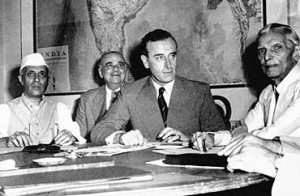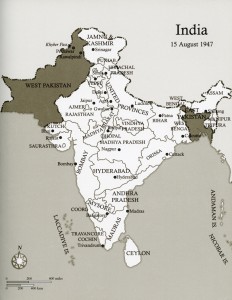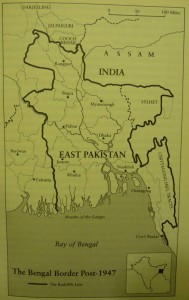When India gained independence from the British in August 1947, Partition also divided the nations into East and West Pakistan, India, and princely kingdoms. Muhammed Ali Jinnah representing the Muslim League , Jawaharla Nehru and Mohandas Karamchand Gandhi represent the Indian National Congress are seen as the key actors, along with Louis Mountabatten, the last viceroy of India, to have created the new borders for India and Pakistan.

Millions left for their promised new homeland with smiles on their faces as trains left both India and Pakistan. This is a train to Pakistan being given a warm send-off. (BBC- http://news.bbc.co.uk/2/shared/spl/hi/pop_ups/06/south_asia_india0s_partition/html/2.stm)
Meghe Dhaka Tara (The Cloud-Capped Star) centers around a refugee family who moves to India from East Pakistan.
Mr. Hiralal Bhattacharjee gives a personal account about the Partition of 1947 and describes the atmosphere in Bengal during the time of Partition. Bhattacharjee specifically talks about his experience living in Bengal area, but there is also many personal accounts from witnesses and survivors in the 1947 Partition Archive.
Historian and author, Mukul Kesavan, talks about Jinnah and Gandhi deciding the fate of the nation and the atrocities that follow after the migration of people going to Pakistan and India. Mukhtar Ahmed, a Muslim refugee retells what he witnessed during Partition. (38:01 – 38:49).
While looking for footage and resources on the Partition 1947, there were many documentaries from BBC, the previous colonial power that ruled India. Hiralal Bhattacharjee, Mukul Kesavan, and Mukhtar Ahmed give voices from South Asia who experienced and view Partition differently than portrayed by the British narration of BBC. Their accounts and explanations provide a diversity of voices to the British and American broadcast of the South Asian experience of Partition in the 1960s and the BBC documentaries.
The satirical segment from Jay Hind! (10:49 -13:07) , the comedy show, is a parody on the causation for Partition, which offers comic relief for the mash-up video and a modern perspective of how Indians imagine Partition, juxtaposed with the seriousness of the BBC documentary and the American television segment. The segment is also interesting because it paints Jinnah in a more favorable light than often portrayed in Indian retellings of Partition. (Joyce Ma)


